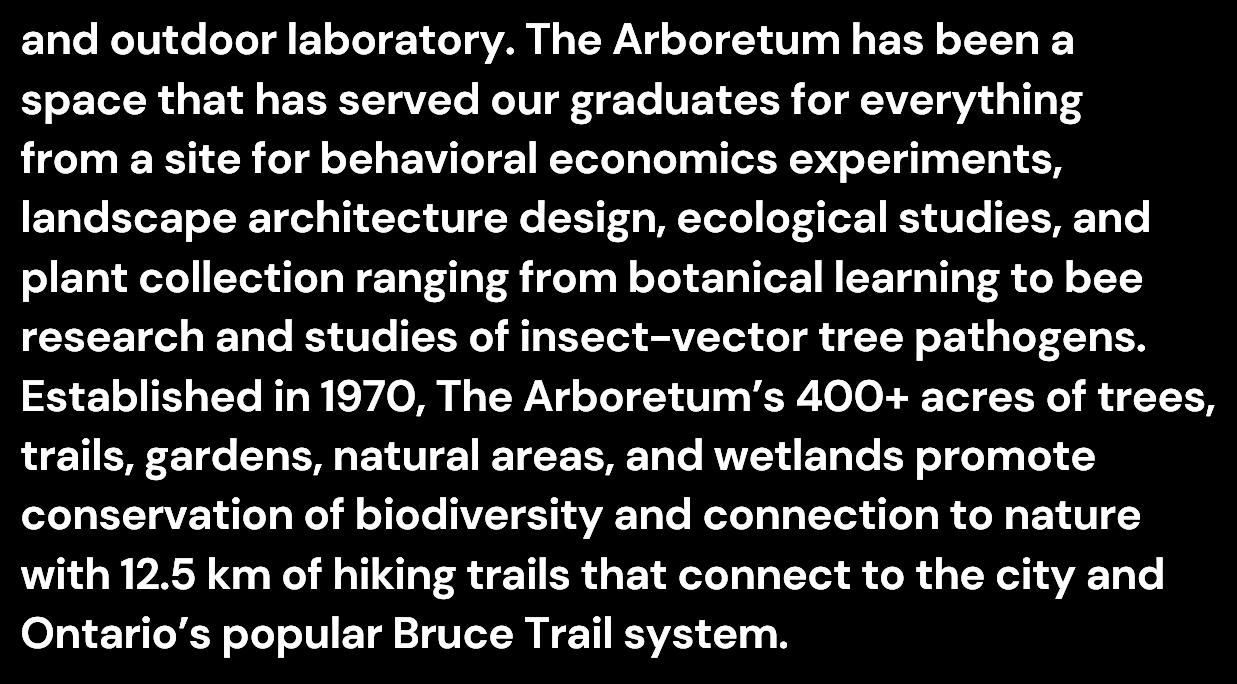




















The Ontario Agricultural College (OAC) of the University of Guelph is recognized globally for its research excellence, teaching and knowledge extension in the broad areas of food, agriculture, communities and the environment.

Established in 1874, OAC is a founding college of the University of Guelph. It has two campuses in Guelph and Ridgetown, Ontario, and research activities are supported and strengthened by a province-wide network of field stations and research facilities
OAC is comprised of six academic units:
Environmental Design and Rural Development
Environmental Sciences


Food, Agricultural and Resource Economics
Food Science
Plant Agriculture
Our community has a strong sense of shared purpose: To Improve Life by inspiring leaders, generating knowledge and creating innovative solutions for food, agriculture, communities and the environment.
OAC at the University of Guelph is well known for its warm and friendly campus atmosphere. U of G is frequently ranked as the best university in the province for its student support, learning and living environment The university offers many opportunities for students to become involved in their community and gain leadership experience
#1 in Canada & #26 in the World
#2 in Canada & #61 for Plant & Animal Science
#5 in Canada & #144 for the field of Environment / Ecology for Agricultural Science in the World in the World
Our international students ranked us #1 in Canada for overall learning, living and student support*


U of G is one of Canada’s most research-intensive universities and ranks as one of the country’s top comprehensive research institutions It is internationally regarded as a research leader.
International in reputation, global in reach
OAC’s research activities play a significant role in the University’s research profile. OAC is recognized around the world for its research expertise in the areas of plant and animal production, sustainability and welfare, community and policy development and environmental studies and solutions.
OAC sits at the heart of an ever-growing agri-food industry that employs more than 800,000 people in the province OAC delivers research, education and laboratory services in collaboration with many governmental partners such as the Ontario Agri-Food Innovation Alliance aiming to further the long-term global competitiveness and sustainability of Ontario’s agriculture and food system.

OAC is committed to developing global citizens that Improve Life globally and within their community. Our researchers and scholars provide expertise and insight to help solve some of the most pressing challenges facing our world.

Dr. Christine Baes and her team created the first national genetic evaluation for low-methane dairy cows, winning the University’s Innovation of the Year Award in 2023. By using genomic selection and milk sample analysis, Dr. Baes is making dairy farming more sustainable and positioning Canada as a leader.
Dr. Helen Hambly, working with Forest Foundation Philippines and colleagues on a project to combat climate change using nature-based solutions, is focusing on capacity building and gender-sensitive resource management to reduce climate change and biodiversity loss
Environmental Sciences
Dr. Asim Biswas, recipient of the prestigious 2024 Steacie Prize for young researchers, uses data management, soil sensors, and maps to help farmers reduce fertilizer use, increase crop yields, and preserve the environment. His research underscores the critical importance of soil health for feeding growing populations.
Dr. Alejandro Marangoni and his PhD student, Stacie Dobson, are leading innovative research in the global food industry Collaborating with Daiya Foods, they have co-invented high-protein plant-based cheese that mimics the taste and texture of dairy products This sustainable alternative aims to meet the growing consumer demand for environmentally friendly food options
Dr Mike von Massow, an expert in food economics, focuses on food value chains and revenue management. His work with food waste reduction projects, including cutting household waste and creating nutritional supplements from surplus fruit, aims to enhance food system sustainability and tackle food security challenges
Dr Adrian Correndo, the Pick Family Chair in Sustainable Cropping Systems, specializes in agronomy and soil fertility. He believes that sustainable cropping systems require an integration of multiple areas of research, stressing the importance of studying environmental, economics, and social dimensions to identify the best crop and soil management techniques.
“As a student from India, I was looking for institutions all over the world to pursue my graduate studies. The OAC is one of the world’s leading institutions for specialized agricultural research with research standards second to none and staggering real-world impacts.”
Ajwal Dsouza
PhD Environmental Sciences
Current Student
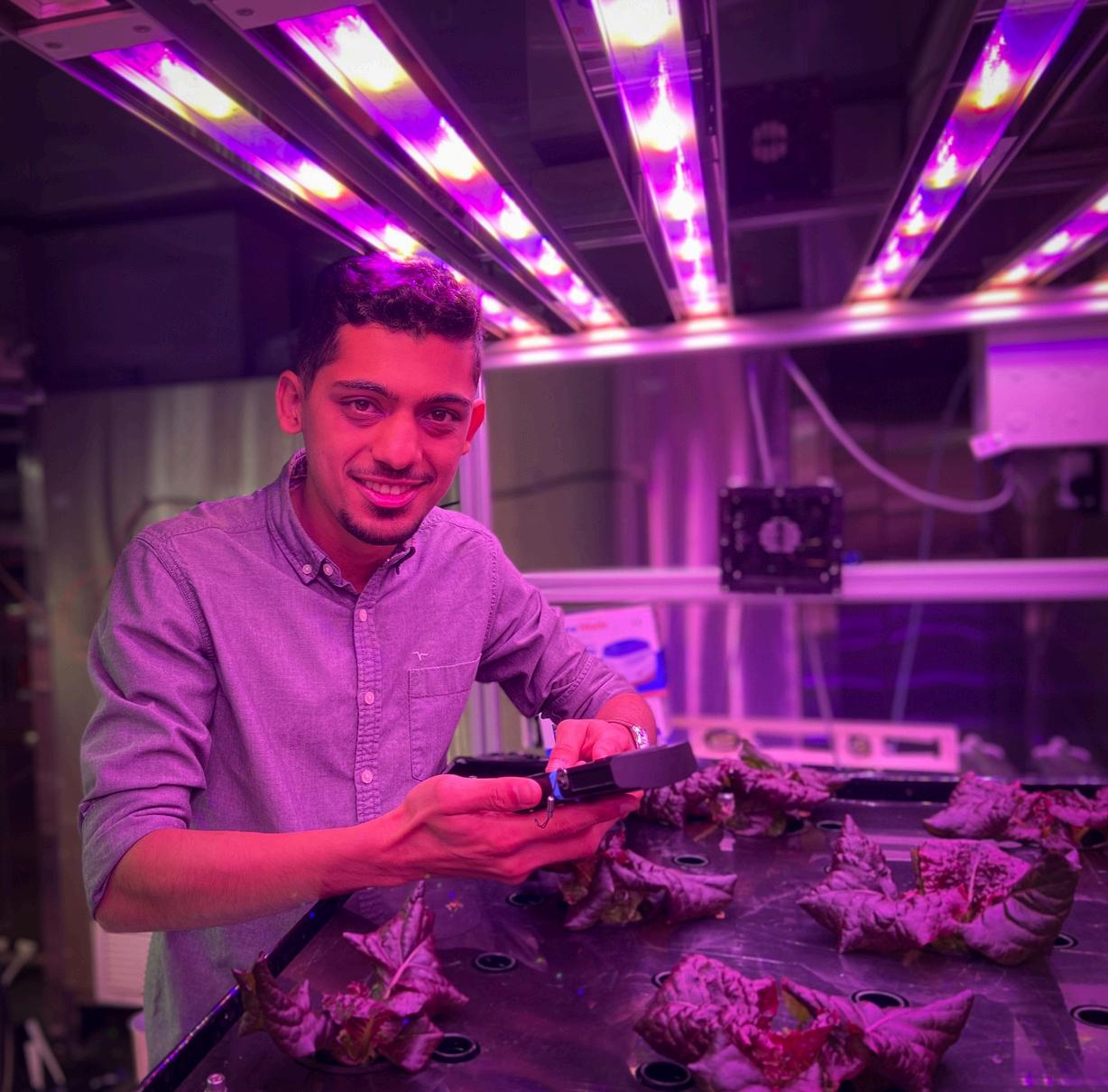



OAC has 6 Canada Research Chairs, 17 research centers and institutes, and access to an extensive list of research stations across Ontario.
In addition to our Canada Research Chairs, OAC is home to NSERC Industrial Research Chairs and many Donor & Partner Supported Chairs and Professorships.
To support research being performed at OAC, our researchers have access to cutting-edge facilities, research centres and institutes, such as:
The Arrell Food Institute
Aquaculture Centre
Bioproducts Discovery and Development Centre
Campbell Centre for the Study of Animal Welfare
Canadian Research Institute for Food Safety Centre for Agricultural Renewable Energy and sustainability
Centre for Genetic Improvement of Livestock Centre for Land and Water Stewardship
Centre for Nutrition Modelling
Controlled Environment Systems Research Facility
Dairy at Guelph
Gosling Research Institute for Plant Preservation
Guelph Centre for Urban Organic Farming
Guelph Turfgrass Institute
Honey Bee Research Centre
• •
Institute for the Advanced Study of Food and Agricultural Policy
Soils at Guelph
Check out our faculty and the research they perform!
OAC Faculty List and Areas of Study
In May 2024, the OAC celebrated 150 years of internationally renowned excellence in research, teaching, and innovation in food, agriculture, communities, and the environment. Learn more about our 150th anniversary celebrations here!
Advance your career with access to a network of world class research facilities.
Research Centres and Institutes provide graduate students with hands-on experience and access to state-of-the-art equipment and facilities as they complete their PhD and Master’s research. The research conducted at these centres promote agri-food discoveries, validate laboratory findings, stimulate further research and provide valuable information for the agri-food sector and beyond .

The Bioproducts Discovery and Development Centre (BDDC) at the University of Guelph is at the forefront of creating sustainable, plant-based alternatives to conventional fossil fuel-based products By accelerating global research on biomaterials, the BDDC is addressing urgent climate challenges by finding new uses for waste that are typically destined for the landfill.
Supported by funding from Competitive Green Technologies (CGTech), this center advances innovative research under the leadership of Dr Amar Mohanty, an internationally recognized expert in sustainable materials This centre supports the development of eco-friendly products, such as biocomposites made from discarded coffee bean skins, to reduce reliance on single-use plastics and greenhouse gas emissions, promoting a circular economy.

“Working on this research and teaching journey with talented and hardworking graduate students has been a privilege. Every step we’ve taken together, facing challenges and celebrating successes, has left a deep and heartfelt impression on me. I’m confident that this will be a voyage we cherish and celebrate with pride when we look back.”

Building on the Ontario Agricultural College’s 150 years of excellent research and training experience, our graduate students today are doing phenomenal things to impact and improve life in the areas of agriculture, food, animals, communities, and the environment!
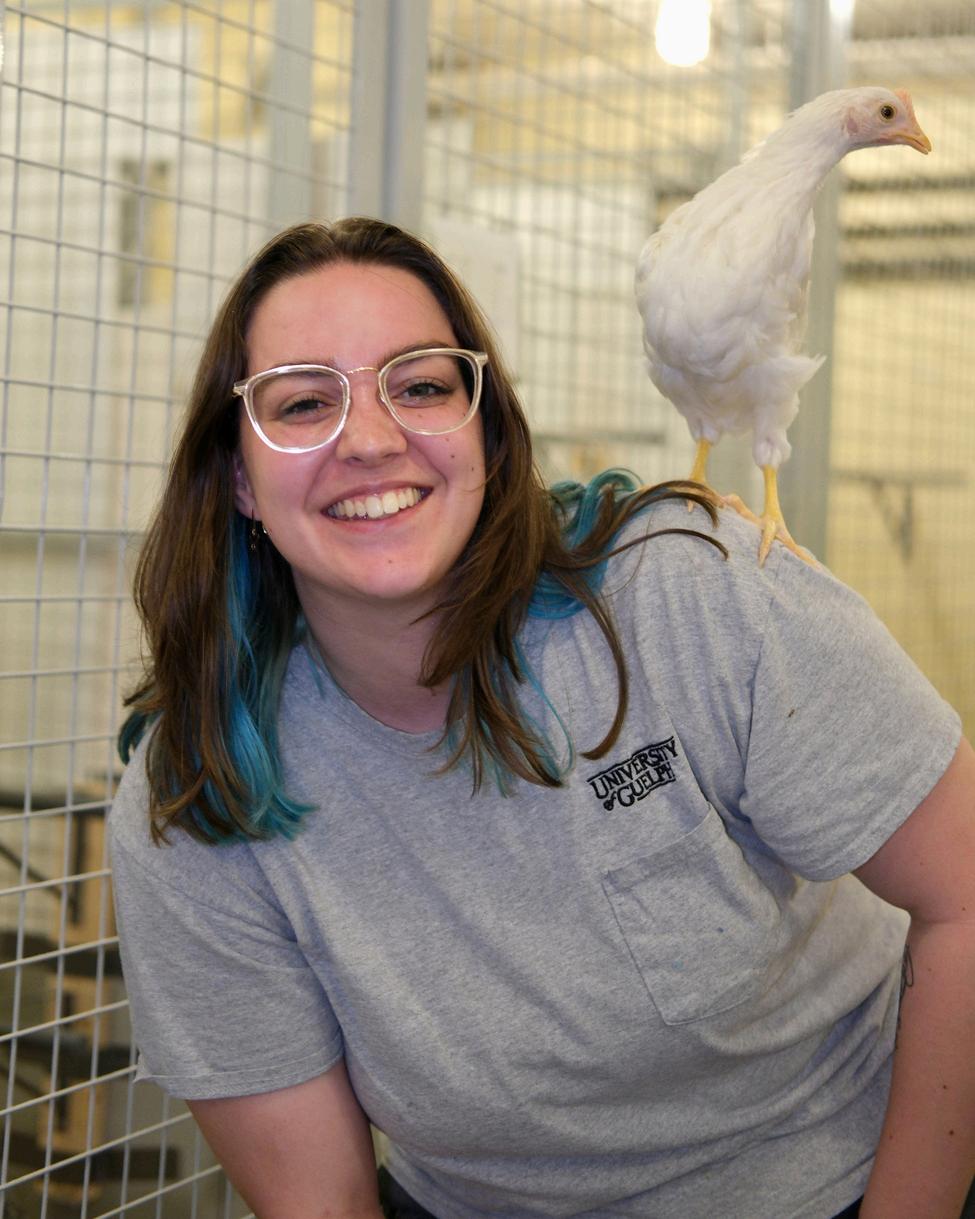

“I am researching the development of

“I researched sustainable and
effective approaches to a complex soil disease that affects apple trees. Conventional fumigants do not provide long-term disease suppression and have environmental impacts. My research identified beneficial microbes and resistant rootstock to overcome the disease."

“My graduate research focuses on the
“My research focused on developing
design guidelines to reduce stress in urban public greenspaces, informed by epigenetics. The aim of publishing these guidelines is to enhance mental health during critical periods when the brain is highly adaptable. Designing environments that reduce stress can potentially lower the risk of certain chronic illnesses."
perching behaviour in laying hen pullets (young hens), trying to see whether they have a preference for grasping perches or elevated surfaces. This research will help influence the future codes of practice to improve the welfare of laying hen pullets in commercial aviaries." fungus called Fusarium affects cereal grains like wheat and barley around the world, especially in Canada. I'm studying how different climates impact the spread and severity of this fungus. This research can help farmers and scientists find better ways to protect crops and ensure the grains we eat are safe and of good quality.”
significant impact of the COVID-19 pandemic on Canada's agri-food trade and the resilience strategies required to mitigate these effects. This research provides valuable insights for policymakers and stakeholders to develop innovative policies that enhance the sustainability of agri-food trade in a post-pandemic world."

“My research focuses on how a harmful

“My research focused on identifying
and addressing the housing needs of International Agricultural Workers in Ontario, suggesting amendments to establish consistent housing standards and strengthen regulation enforcement. Standardized protections for workers would support agricultural operations and foster healthier rural economies."
Damilola Oyewale
Alumni, MSc (thesis) in Rural Planning & Development


“My research focuses on food
chemical safety, especially in lessstudied food products. I'm studying acrylamide in popular pastries in West Africa and plant-based meat. My goal is to measure how much acrylamide people consume from these foods and develop ways to reduce it, ensuring safe food for everyone. "
Chinaza Arinzechukwu
Current Student, PhD in Food Science
“My research is focused on producing
sustainable insect based feeds for the aquaculture industry. We are examining the effects on fish health using growth metrics and the gut microbiome, nutrient utilization and final fillet quality. The goal is to determine the whole effects of these novel ingredients from an environmental, animal health and producer perspective.”
Sonja Drosdowech
Current Student, PhD in Environmental Sciences



"During my Major Research Project
for my master's, I worked on a clinical trial comparing treatments for gastric ulcers in performance horses. This research allows us to further understand treatment options for an issue faced by many performance horses."
Mary Margiotta
Current Student, MSc (course-based) in Animal Biosciences
“My graduate research examined the framework of government land policy in the Northwest Territories and its impact on housing in NWT communities. This research could influence changes to the land leasing system in the NWT, with the ultimate goal that Indigenous residents no longer have to pay the government of the NWT to have a home on their own land."
Chris Van Dyke
Alumni, Master of Planning (MPlan)
“My research focuses on developing
strategies to mitigate methane emissions from agricultural livestock, a major contributor to greenhouse gas emissions. My work aims to promote sustainable agricultural practices and reduce the environmental impact of livestock production. This could inform policy decisions and advance climate change mitigation efforts."
Navdeep Saini
Current Student, PhD in Environmental Sciences
OAC has 16 master’s degrees thesis and course-based options and 6 PhD programs that focus on food, agriculture, communities and the environment, housed within six departments and schools.
~2yearsoffull-timestudy*
Researchfocused(minimalcoursework)
Submissionofathesisthatcontributesanoveltoolortheoryina specificresearchareaResearchconductedisanin-depthanalysisof ascientifictopicandcouldbecomeapublishedpaper.
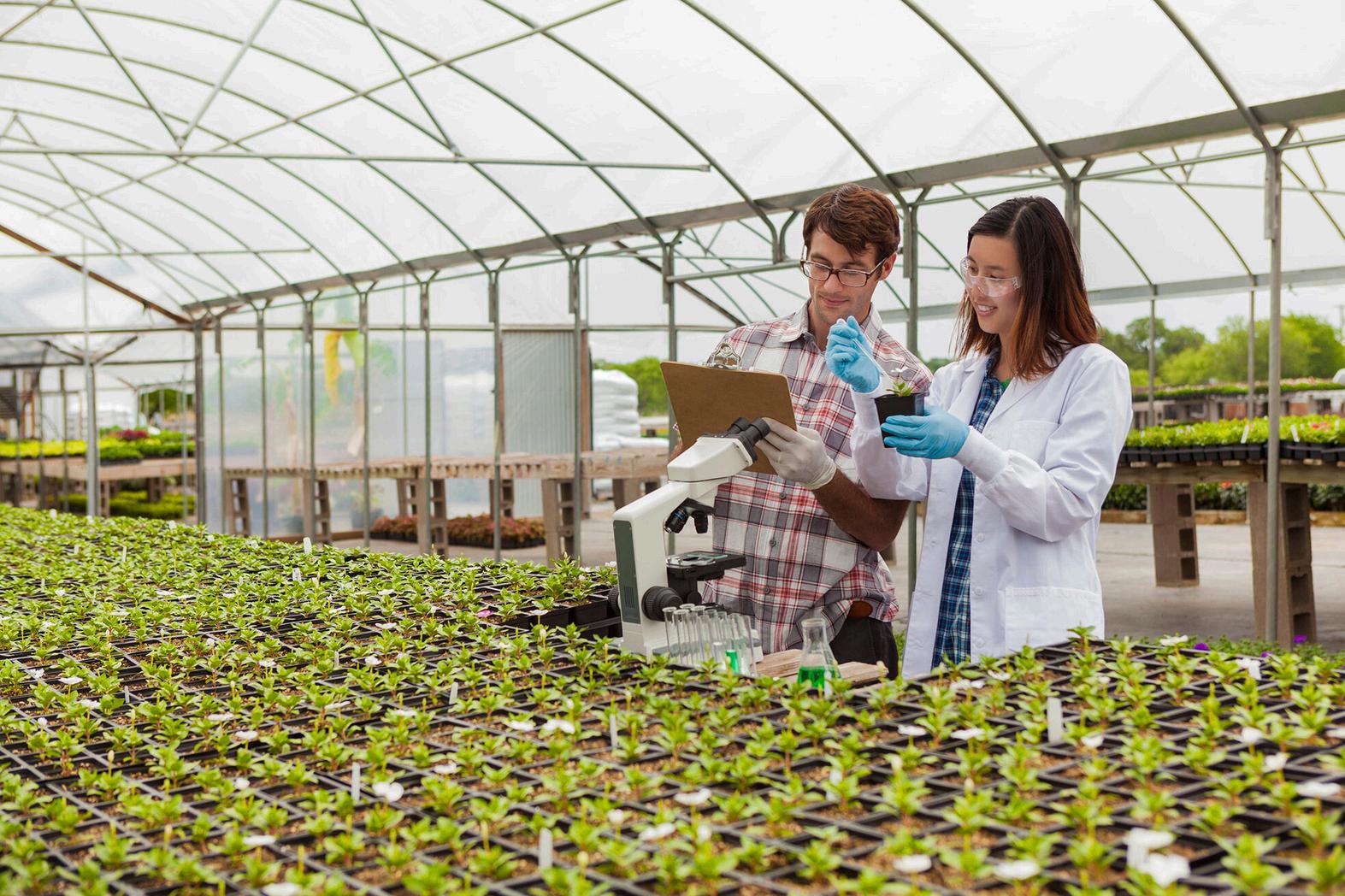
Findingafacultyadvisorrecommendedpriortoprogramapplication
~1yearoffull-timestudy
Coursework-focusedtodevelopamasteryofaspecificareaofstudy
Oftenincludeswork-integratedlearningopportunitiessuchas internships
Facultyadvisornotrequiredpriortoapplication
1–2yearsoffull-timestudy
Combinationofcourseworkandamajorresearchproject(MRP)
AMRPissmallerinscopethanathesisproject.
Facultyadvisormayberequiredpriortoprogramacceptance
~4yearsoffull-timestudy*
Researchintensive
Submissionofathesisthatisamajorcontributiontothediscipline. Researchfocusonanoveltoolortheoryinaspecificresearcharea
Findingafacultyadvisorrecommendedpriortoprogramapplication, requiredpriortoacceptance
Someprogramsmayalowstudentstotransferfromamasters programintoadoctoralprogram,basedonprogress
*Somedisciplinesmaytakelongertocomplete,timelinesprovidedare theaverageprogramduration.

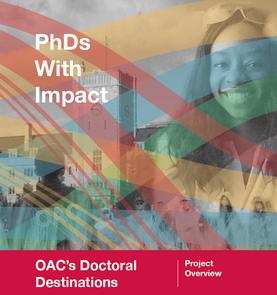
The future is bright for OAC graduate students.
There is an abundance of opportunities for OAC graduates. The OAC Destinations initiative documents graduates from OAC’s 15 graduate programs from 1999 to 2019 and their career status as of 2019. By identify- ing the career pathways of our graduates, we are able to illustrate their broad aptitudes and the many ways in which they have applied their educational and research experience to a variety of careers.
Explore the Destinations Initiative Reports here
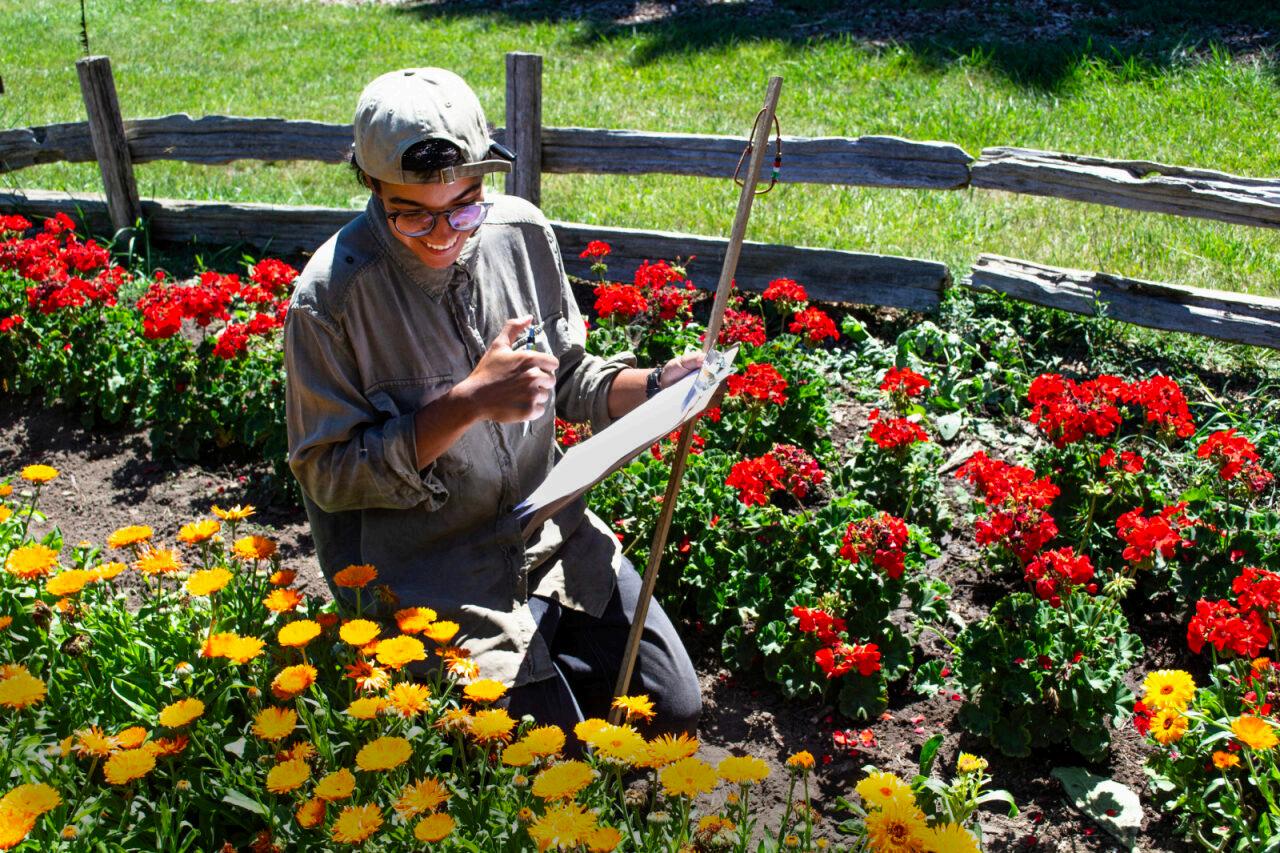



Master’s Program
Animal Biosciences (MSc) In Person Thesis Coursework In Person
Capacity Development & Extension (MSc) Thesis Coursework
Environmental Sciences (MES)
Environmental Sciences (MSc)
Food Agricultural & Resource Economics (MFARE)
Food, Agricultural & Resource Economics (MSc)
Food Safety & Quality Assurance (MSc)
Food, Agricultural & Resource Economics
Coursework In Person In Person Thesis
Coursework In Person In Person Thesis
Coursework Hybrid Online Thesis
Food Science (MSc) In Person
Landscape Architecture (MLA) Coursework In Person
Plant Agriculture In Person Coursework In Person Thesis
Plant Agriculture (MSc)
Rural Planning & Development (MPLAN)
Coursework
Rural Planning & Development (MSc)
Sustainable Agriculture
Thesis Coursework In Person
Coursework In Person
Collaborative Specializations
(can be added to a participating degree program)
International Development Studies
One Health Neuroscience
Toxicology
Description
This collaborative specialization provides a focal point for graduate teaching and research in the area of international development that combines training in a particular discipline with exposure to a broad range of social science perspectives
A collaborative specialization that fosters strong collaborative efforts between faculty and students working across various levels of analysis including molecular, cellular, systems, and behavioural research
This collaborative specialization prepares future leaders for the complex challenges at the confluence of human animal, and environmental health, working across disciplinary boundaries, conducting multidisciplinary research, mobilizing knowledge, and informing policy
This collaborative specialization encompasses broad and diverse fields of study such as
ecosystem health, including water, air and soil quality, plant health, microbes and insects, sustainable agriculture and human and animal health
Social & Economic Change
Environment & Sustainability
Social Justice & Human Rights
Food Security & Health
Gender & Identities
Participating Degree Programs
Capacity Development & Extension
Environmental Sciences
Food, Agricultural & Resource Economics
Plant Agriculture
Rural Planning & Development
Behavioural Neuroscience
Neuroanatomy
Brain Disorders
Neuropharmacology
Neurophysiology
Climate Change & Environmental Degradation
Emerging Infectious Diseases
Antimicrobial Resistance
Food Safety & Security
Health Inequalities
Animal Biosciences
Animal Biosciences
Environmental Sciences
Food Science
Rural Planning & Development
Environmental Toxicology
Molecular Toxicology
Biomedical Toxicology
Animal Biosciences
Environmental Sciences
Food Safety & Quality Assurance
Collaborative specializations are intra-university graduate fields of study that provide additional multidisciplinary experiences for students enrolled in and completing the degree requirements of an approved masters or doctoral program.
Research and educational programs in the Department of Animal Biosciences revolve around the basic sciences relevant to animal development and wellbeing.
Advisor Required at Application
Funding
Self-funded*
*Students with strong applications might be eligible for various entrance and in course awards and scholarships
**Tuition amounts are subject to change and do not include additional fees For actual costs please refer to Graduate Fees page
Animal Breeding and Genetics
Animal Nutrition
Animal Physiology
Animal Behaviour and Welfare •
Students and faculty have access to high quality animal research facilities, a modern and federally inspected meats laboratory, and a range of laboratory facilities in genomics, nutrient analyses, physiology, and microbiology The department also has unique oncampus large farm animal study rooms and surgical recovery facilities for animal research
Students are very successful after they graduate Within 6 months of graduating, over 90% of Animal Biosciences graduates go on to future training or careers related to their program.
Find out more about our faculty here
There are two ways to complete your master’s program within the Department of Animal Biosciences: MSc by course work or MSc by thesis.
The MSc coursework is a 1-year program for specialized training in different aspects of the animal sciences.
The MSc by thesis program is a 2-year program designed for students interested in advanced research.
The innovative research conducted ranges from the applied (designed to solve practical problems in animal agriculture) to discovery-focused, cutting-edge research aimed at testing fundamental hypotheses in animal biology.
Find out more about our thesis program here
Find out more about our coursework program here
Find out more about our PhD program here
Graduate programs offer “hands on” experiential learning opportunities for research with a large selection of livestock animals, equine, companion animals, wildlife, aquatic and more to complement a wide range of graduate courses.



“My hands-on experiences during my MSc have provided me with invaluable insights into animal behavior, management practices, and the practical applications of my research. Working directly with farmers and livestock allowed me to see the direct impact of my research findings and reinforced the importance of bridging academic knowledge with real-world applications.”

“In this department, students participate in well-designed and executed science, learn how to properly analyze those and interpret the results with caution and insight. You will conquer your fears and build your knowledge and skills. Science is fun and if you love it, then you will find yourself a fulfilling career.”
Dr.
Kate Shoveller Professor, Animal Biosciences
The School of Environmental Design & Rural Development (SEDRD) reflects the imperatives in building authentic communities where planners, leaders, communicators, landscape architects, the citizens and politicians all play important interdependent roles in community strength .
Capacity Development and Extension
Landscape Architecture
Rural Planning and Development
Rural Studies PhD
Find
MSc Capacity Development and Extension (CDE)
This program is unique in Canada and focuses on processes of learning, advocacy, leadership, communication and capacity development for for rural, remotes and small communities in Canada and around the world Students develop core competencies for facilitating social and environmental change In addition to coursework, students write either a thesis or major research paper The thesis option requires the completion of 6 courses in addition to the thesis, while the major paper option requires the completion of eight courses and the major research paper.
Find out more about CDE research here
Master of Landscape Architecture (MLA)
This program is for people seeking a graduate degree in an intensive, internationally-recognized design program. The MLA program is unique in being an accredited graduate degree in landscape architecture, and Canada’s first professional degree program in landscape architecture
The MLA curriculum has three integrated streams: design theory and practice, landscape analysis and planning, and research inquiry and application The final year of the MLA program is focused on the completion of a master’s thesis Internships and summer employment opportunities provide students with paid professional experience in some of North America’s most prestigious firms
Find out more about the
program here


“At its core, rural studies is an interdisciplinary topic, the study of which can range from domestic to international, from capacity building to addressing various social, economic, environmental, and/or cultural issues in rural communities.”
GraduateProgramAssistantcontacts
MLA
DianaFoolen
dfoolen@uoguelph.ca
CDE, MPLAN, MSc Planning
Lorena Barker
cde@uoguelph.ca
rpd@uoguelph ca

“Food is something that connects
everyone. Whether you produce food or consume it, we are all part of the agri-food system. Planning for this system is important for the health of the industry, rural communities and society more broadly. As a graduate student, you are a researcher and should feel ownership of the work you do.”
Dr Sara Epp
SEDRD Assistant Professor and Latornell Chair
Within the Rural Planning & Development program there are two graduate degrees: a Master of Science in Rural Planning and Development (MSc) and Master of Planning (MPlan). Both programs provide the opportunity for graduate study, research and professional development in rural planning and development in either Canadian or international contexts.
This 2-year program is intended for students with a completed undergraduate degree interested in planning and development Students focus their program of study in either the Canadian or International stream The program can be completed with a thesis, major research paper, or as a course-based option. The MSc program is an accredited degree by the Professional Standards Board, facilitating membership in the Canadian Institute of Planners and provincial planning organizations.
Find out more about Planning research here
This 1-year program is intended for students with a completed undergraduate degree and 4 – 5 years of planning and development experience, who wish to upgrade their professional training to the Masters level without necessarily withdrawing from the work force. The MPlan program is offered inclass or via online learning, and offers students the opportunity to specialize in either the Canadian or International stream
Find out more about MPlan here
Interested in a PhD program?
Find out more about our PhD program here
Graduate Program Assistant contact Lorena Barker | lbarker@uoguelph.ca
The focus is on rural, Indigenous, and remote communities in Canada Students gain critical knowledge and skills sets in planning theory, planning law, plan formation, implementation, project management, and evaluation. These skills are developed and demonstrated through community-based course projects, case studies, and student research.
Prepares students for practice and research in rural and regional development planning in the international context. It focuses on the rural regional dimension within a national or global context, in particular the policy, planning and management processes that are driving development interventions. It emphasizes applied research and practice based on a firm foundation of theory




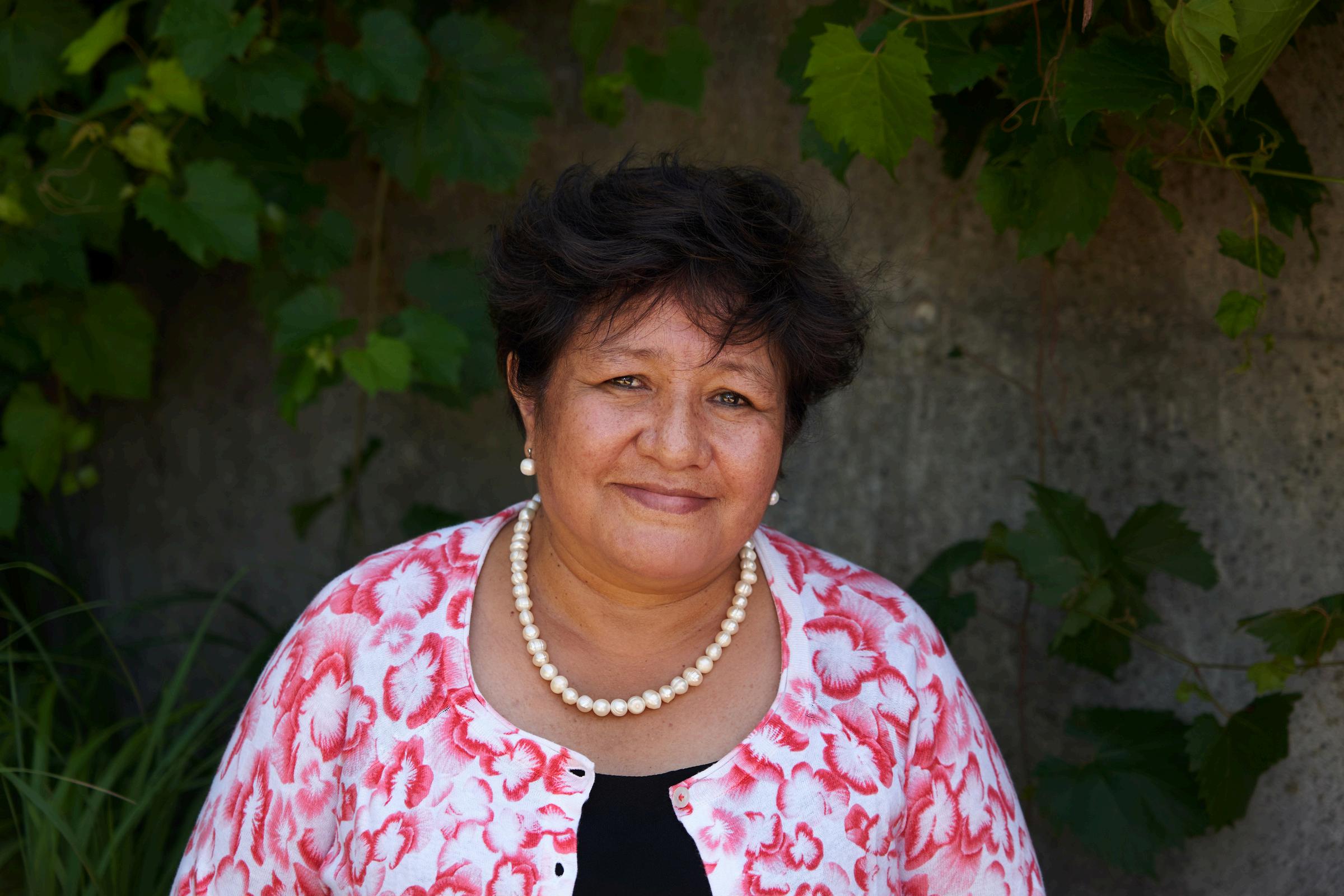
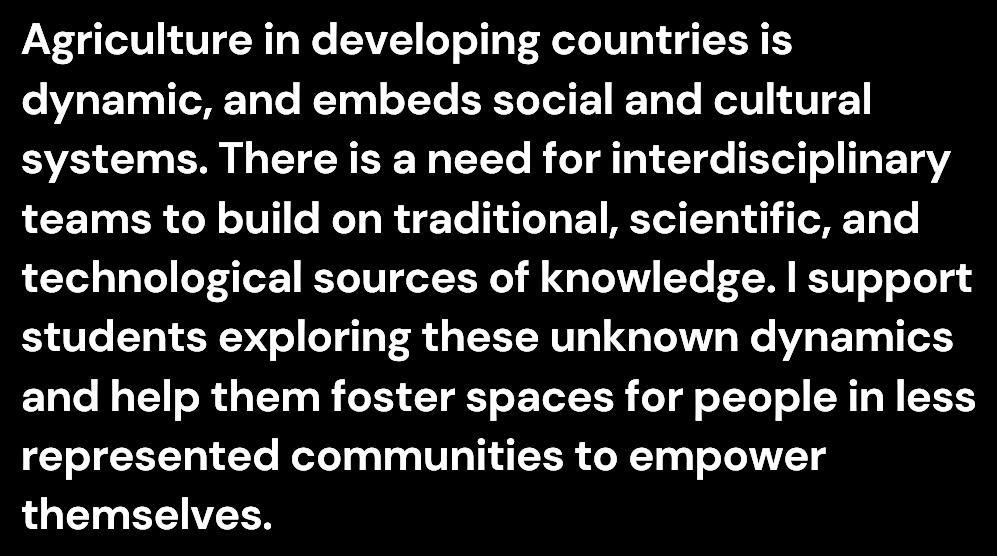

The School of Environmental Sciences (SES) uniquely integrates the physical and life sciences to address important environmental problems in agricultural, forest, and aquatic ecosystems.
Students with
Tuition amounts are subject to change and do not include additional fees For actual costs please refer to Graduate Fees
Earth and Atmospheric Science
Plant and Environmental Health •
Ecosystem Science and Biodiversity
Award winning faculty and research expertise spans several disciplines including apiculture, atmospheric and earth sciences, ecology, entomology and pest management, environmental microbiology, plant pathology and protection, soil science, and environmental toxicology.
Master
This course-based program focuses on the most recent theoretical and technical advances in environmental science, through interdisciplinary and multidisciplinary teaching and research, to provide students with both a depth and breadth of knowledge. Students will develop critical thinking and communication skills so that they can excel in a career with industry, government or in the not-for-profit sector
Environmental Sciences
The objective of this thesis-based program is to develop graduates with a high level of knowledge and expertise in specific aspects of environmental science, training in laboratory and field techniques, and excellence in written and oral communication Graduates will possess a strong foundation on which they can be highly successful in science-related positions in government, industry, and consulting, or carry out high quality research at the PhD level

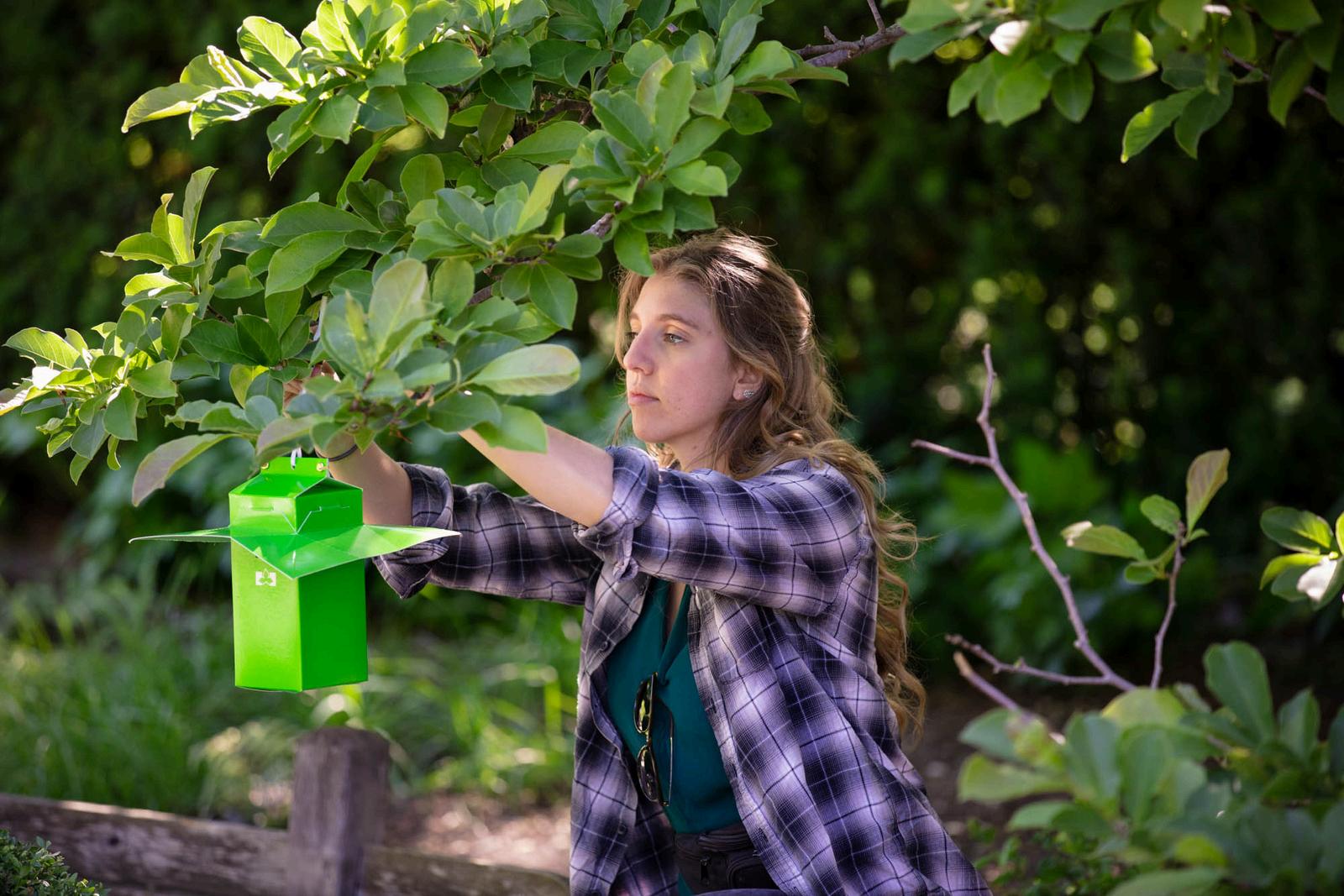

“As a graduate student within the OAC, some of my most memorable experiences include the collaborative projects I participated in, which often involved interdisciplinary teams. This program excels in bringing together various disciplines such as biology, technology, and environmental science to address agricultural challenges.”
Olatunbosun Ayetan
Current Student, PhD in Environmental Sciences
Advisor: Richard Heck, Adam Gillespie

“My research program integrates
traditional agriculture and soil science with modern technology and data. I take the mentorship of my graduate students very seriously because they sustain my research program. Without them, my program is nothing.”
Dr. Asim Biswas Professor and Graduate Program Coordinator, Canada Research Chair, OAC research Chair in Soils and Precision Agriculture
Graduate students in the Department of Food, Agricultural & Resource Economics (FARE) study issues related to trade, policy, resources and new technologies. The scope of study incorporates all parts of the food system from farm to fork.
Food and agricultural economics
Natural resource and environmental economics
Students apply their rigorous training and research experience in a number of rewarding ways. Through their research, students gain an appreciation of the policy environment within which provincial, federal and private organizations exist, and are prepared for successful careers in the government, academia and private sectors upon graduation
Find out more about our faculty here
Master of Food, Agricultural & Resource Economics (MFARE)
This course-based program provides graduate education related to the economics of food, agriculture, and natural resources, with an emphasis on skills acquisition and development of industry-specific expertise
Duration
Advisorrequiredfor
Students have the choice of completing a major research paper or engaging in a consultancy project for a real-world client. MFARE students are eligible for funding, but it is not guaranteed
Find out more about our MFARE program here
MSc Food, Agricultural & Resource Economics (MSc FARE)
The thesis-based MSc develops fundamental understanding of economic principles and their application in identifying and solving relevant problems related to food, agriculture, and natural resources The program develops appropriate analytical, methodological, and communication skills for students to analyze agriculture and resource problems effectively and explain their findings
Find out more about our research here
Interested in a PhD program?
Find out more here
Find out more about our PhD program here
Students with strong applications might be eligible for various entrance and in course awards and scholarships.
Tuition amounts
and
FARE has strong links internationally. Graduate students in the department are drawn from North America, Europe, Latin America, Africa and Asia. The multicultural nature of the graduate student body enriches the experience of both students and faculty in the department.


“This program has offered me an opportunity to meet and learn from the amazing professors in the FARE department! Through coursework as well as the process of choosing your thesis topic, there are abundant opportunities to dig into exciting areas of economics. My interest lies in experimental economics, [whereby] we can understand consumers’ and producers’ behaviour regarding a variety of topics in agriculture and beyond!"

“In the FARE department, we conduct cutting-edge research to advance academic knowledge, inform public policy through evidence-based recommendations, and address societal challenges, while actively engaging with the broader community to apply economic ideas to real-world problems. Our programs are unique and equip students with the essential skills and knowledge for successful careers in academia, industry, government, and nonprofit sectors."
With a focus on developing sustainable, safe and innovative foods aimed at improving human health, the Department of Food Science conducts interdisciplinary research spanning the fields of chemistry, biology, microbiology, natural product chemistry, nanoscience, physics and nutritional science.
Duration
Advisor Required at Application
Funding
Degree
Requirement MSc FSQA (Coursework) MSc (Thesis) PhD
Honours bachelor’s degree in sciences (with courses in food science, nutrition, public health or other related fields)
BSc degree in Food Science, Chemistry, Biology, Microbiology, Physics or other related degree
Admission
Requirement
Application
Deadline
Entry
Food Processing
Food Microbiology
Food Chemistry
The Food Science program at OAC is the only one of its kind in Ontario and has trained a large percentage of the food scientists currently employed in Ontario’s food and beverage industry; the third largest in North America. •
Facilities include individual laboratories, teaching laboratories, a core laboratory (focusing on analytical chromatography), a state-of-the-art dairy processing plant, an experimental kitchen, a newly renovated food processing facility and a level II biosafety facility
Meet our Food Science faculty here *Students with strong applications might be eligible for various entrance and in course awards and scholarships **Tuition amounts are subject to
This course-based graduate program is designed to provide a balance of scientific and management principles underlying Food Safety and Quality Assurance. This program is intended for those currently employed as food scientists, food engineers, public health or food safety inspectors, as well as those who have recently graduated from programs with appropriate scientific backgrounds. Students may take this program in one of two formats: a combination of online and on campus courses with a faculty advisor-led research project; or fully online with an approved workplace project.
Find out more about FSQA here
In this thesis-based program, graduates will gain general scientific knowledge as well as a more in-depth understanding of various aspects of food science Extensive laboratory and technical training is obtained by conducting experiments under the supervision of world-renowned faculty.
Find out more about our MSc Food Science here
Whether fresh fruits, vegetables or meats, frozen foods, dairy products, cereals or beer and wine, food scientists have transformed these products from raw ingredients to consumer goods.
Interested in a PhD program?
Find out more here
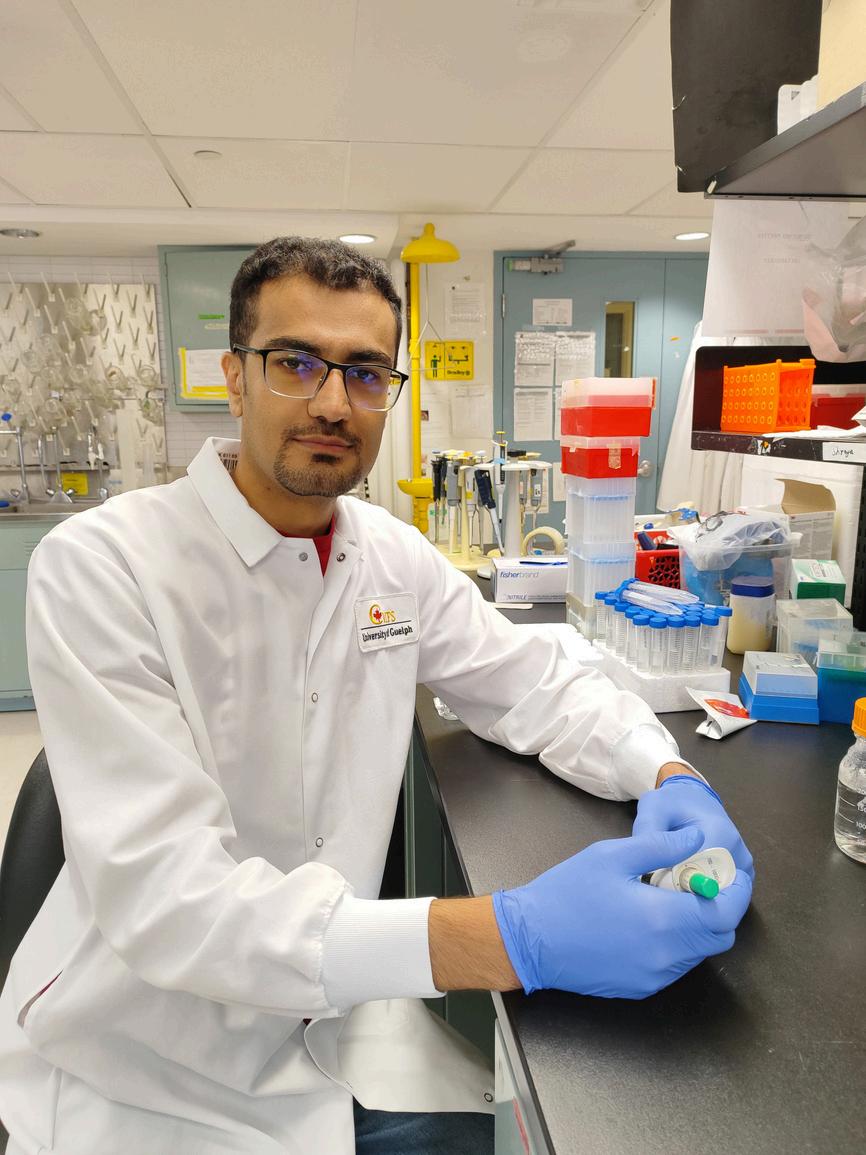

Graduate Program Assistant contacts
FSQA Program Assistant
Robin Verrall
fsqa@uoguelph ca
MSc and PhD Program Assistant
Jon Abram
fsgradsec@uoguelph ca

“Food Science is a unique field
Food Science is unique field where you get to learn about different processes, interactions, and the development that goes into many of the foods we eat everyday. A degree in food science gives you the tools to shape the foods of the future.”

“Our department works on fundamental science (physics and chemistry), while addressing some of the biggest problems of our timesustainability, climate change, loss of biodiversity and human health. In this program, build a strong academic base, develop your research skills, work close to applications and help change the world in a positive way. "
Dr. Alejandro Marangoni
Professor, Canada Research Chair in Food Health and Aging
Strongly rooted in crop science and horticultural science, graduate studies within the Department of Plant Agriculture encompasses applied bioinformatics; molecular genetics; genomics; field, horticultural and greenhouse crops; plant breeding; turf and grassland studies; environmental sustainability; weed science/ecology; and the use of plant materials for health, fibers and industrial products
(Thesis)
Duration
Advisor Required at Application
Funding
Degree Requirement
Admission Requirement
Application Deadline
Entry
An honours bachelor’s degree in a plant science or biology program (or equivalent) Fall, Winter, Summer
MSc degree by thesis in a field appropriate to the proposed area of specialization
*Students with strong applications might be eligible for various entrance and in course awards and scholarships
**Tuition amounts are subject to change and do not include additional fees. For actual costs please refer to Graduate Fees page
Plant Breeding and Genetics
Plant Biochemistry and Physiology
Crop Production Systems
Bioproducts
The Department of Plant Agriculture has modern labs with state of-the-art equipment and access to controlled environment growth facilities and numerous field sites distributed over Ontario Graduate students are provided hands-on learning opportunities from nationally and internationally recognized experts •
Find out more about our faculty here
MSc Plant Agriculture
This two-year program requires students to complete a research-based thesis with a specialization in one of four broad fields within plant science Students develop an understanding of plant growth and development, weed control, and plant-environment interactions. Research for one’s thesis could focus on how to increase plant production efficiency, development of new crop varieties, or discovering new environmentally friendly industrial materials.
Find out more about MSc Plant Agriculture here
Interested in a PhD program?
Find out more here
Find out more about our PhD program here
The Department of Plant Agriculture is Canada's largest and most diverse applied plant biology department, and is the largest research department at the University of Guelph.
Graduate Program Assistant contact Tara Israel pgrad@uoguelph ca
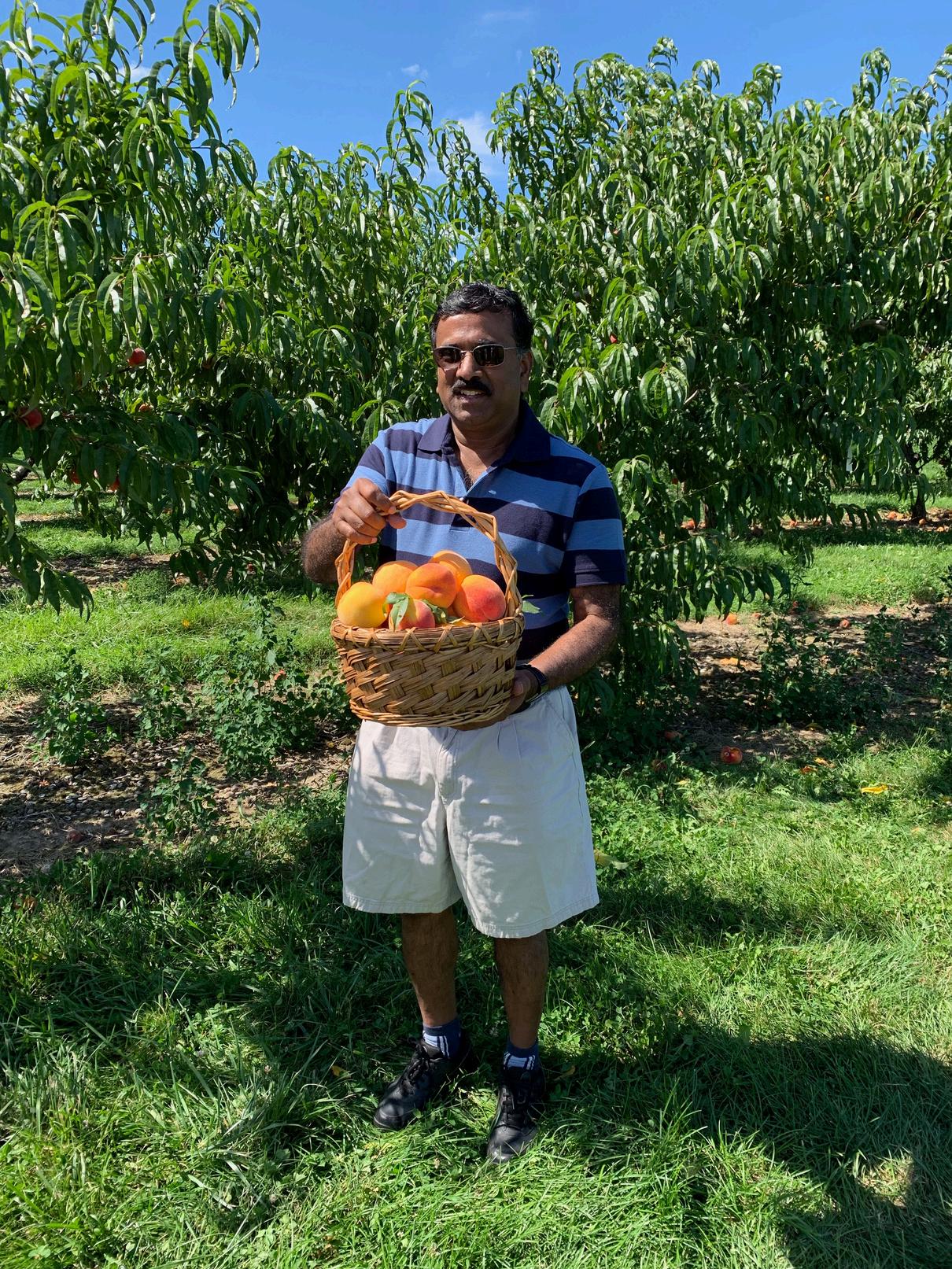

“One standout feature of my
Naincy Sharma program is its emphasis on practical, hands-on research with real-world impact. We work collectively to develop solutions to agricultural challenges faced every day by the farming community.”
Current Student, PhD in Plant Agriculture Advisor: Jayasankar


“Research in the OAC and our program combines curiositybased inquiry with real life application in field-based trials. Graduate studies are an excellent pursuit to determine what you are truly interested in."
Dr K Peter Pauls
University Professor Emeritus, Plant Agriculture
Cultivate your career in the plant and agriculture sector.
The Master of Plant Agriculture (MPAg) program, a new course based program launching in Fall 2024, aims to address the demands of employers in the private and public sectors who are looking for professionals with advanced expertise in plant breeding, crop production and plant science.
Plants and crops play a critical role in our ecosystem and are essential for a sustainable food system. The University of Guelph’s Master of Plant Agriculture (MPAg) program provides students with career-focused knowledge and expertise in plant breeding, crop production and plant science so they can pursue leadership positions in the private and public sector Students can cater their studies to match their unique interests and career-focuseschoose a program specialized in breeding and genetics; biochemistry and physiology; or crop production systems. This program is ideal for recent graduates or working professionals that wish to gain scientific, cross-discipline skills in a hands-on learning environment to advance your career.
The flexible program allows students to complete their degree on a full-time or part-time basis and select courses that match their career goals in breeding and genetics, biochemistry and physiology, or crop production systems for both agronomic and horticultural crops
Duration
AdvisorRequiredatApplication
Funding
DegreeRequirement
Admission Requirement
Application Deadline
Honours bachelor’s degree in sciences (or equivalent)
Graduates of the program will advance their careers and pursue leadership roles in a variety of sectors related to agri-food and plant production.
Employers of graduates of the MPAg program may include:
Syngenta
Health Canada
Canadian Food Inspection Agency (CFIA)
Corteva Agrisciences
Bayer Crop Science
Provincial Government ministries
Agriculture and Agri-Food Canada (AAFC)
Stay up-to-date on this new program

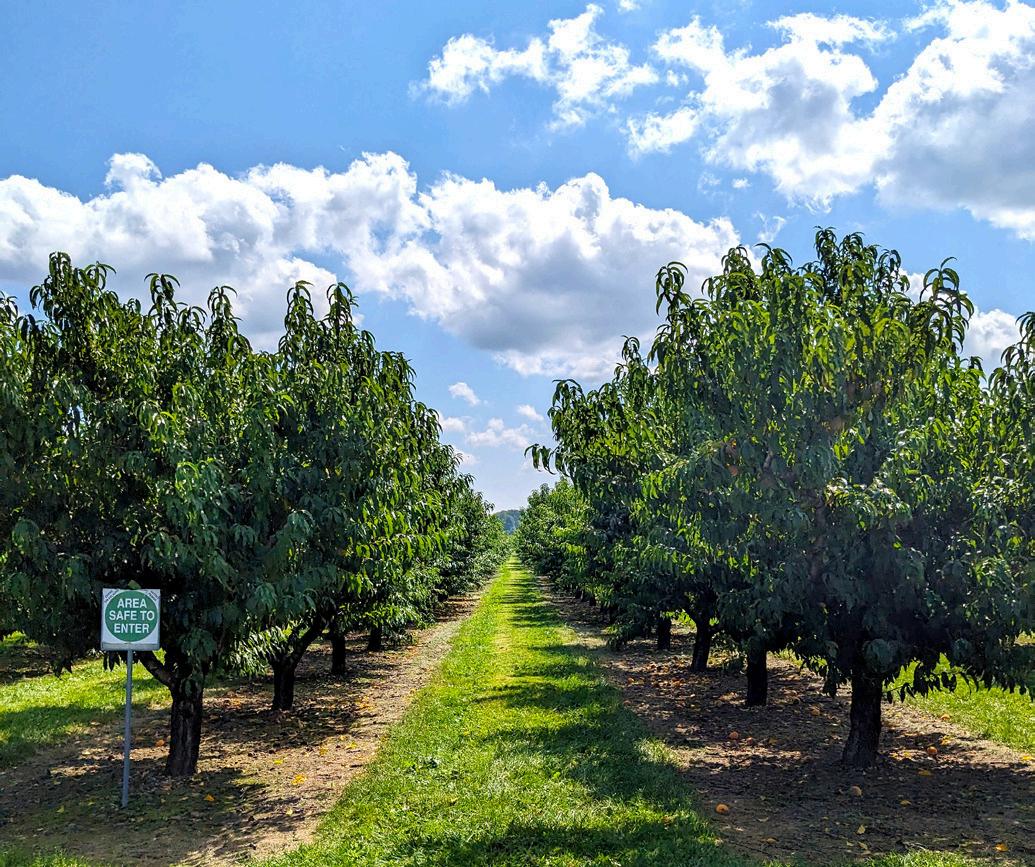


The Master of Sustainable Agriculture (MSAg) program, a new course based program launching in Summer 2025, aims to explore the fields of agriculture, environment, and society, encompassing sustainable production, agricultural economics, data analysis, and leadership, to drive positive change in the global food system.
Duration
AdvisorRequiredatApplication
Funding
DegreeRequirement
Admission Requirement
Application Deadline
The U of G’s Master’s in Sustainable Agriculture program is designed for forward-thinkers ready to cultivate change in the global food and agriculture landscape. Offered by the Ontario Agricultural College (OAC), this inter-disciplinary course-based master’s program equips students with the latest advancements in sustainable plant or livestock agricultural practices, while empowering students with skills in data analysis, agricultural economics, communication, and leadership. Students can customize their career path through specialized fields, flexible course options, professional development opportunities and internships to connect you with hiring organizations.
The course-based option allows students to gain advanced, graduate level skills and knowledge without the requirement of a thesis. This option allows for a shorter program and a hands-on, collaborative approach to learning.
Enhance your expertise and skills in one of three academic fields: • • •
Plant Agriculture
Livestock Agriculture
Environmental Sciences
*Students with strong applications might be eligible for various entrance and in course awards and scholarships
**Tuition amounts are subject to change and do not include additional fees For actual costs please refer to Graduate Fees page




Faculty advisors guide, inspire, and support their students to reach their scholarly potential. The advisor promotes conditions conducive to a student’s research and intellectual growth, providing appropriate guidance on the progress of the research and the standards expected.
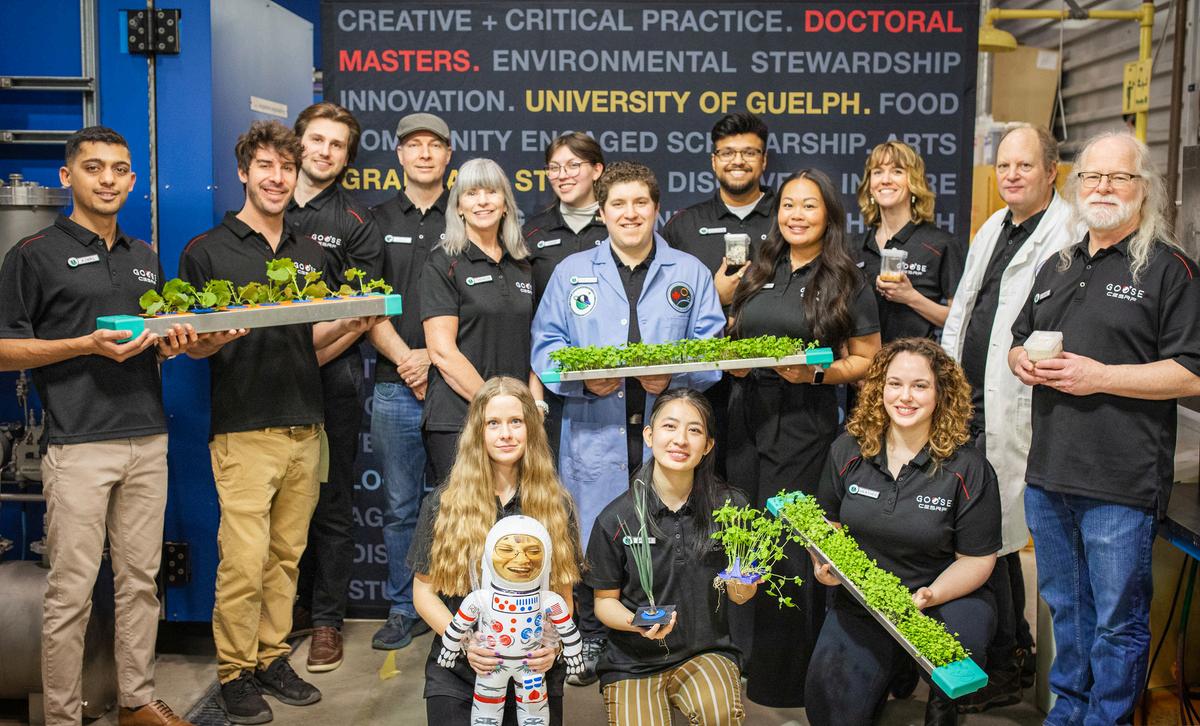

Real world research, guided by real world researchers.
Graduate programs with a thesis or major research paper (MRP) component require a faculty advisor. Thesis students should identify and confirm their faculty advisor prior to application, whereas major research paper students typically find an advisor after starting their program When reviewing and researching potential advisors, here are a few things to keep in mind:
Are you interested in their research?
Does their research align with your learning and career goals?
What is their advising style? Is there funding available?
1. Explore the OAC faculty members page and identify
potential professors you would like to work with
2. Reach out via email to request a meeting with potential advisors to discuss your research interests and future research project opportunities in their lab
3. Important information to include in your initial contact:
Your academic and professional background
(include your academic CV)
Your research experience and interests Why you are interested in working with them If you have received or applied for any scholarships
Tip: Reach out to current graduate students who have worked with your potential advisor. This will give you the graduate student’s perspective on the lab and research.




OAC is committed to improving access to education and encouraging student wellness by creating an environment that supports and nurtures the student as a whole.

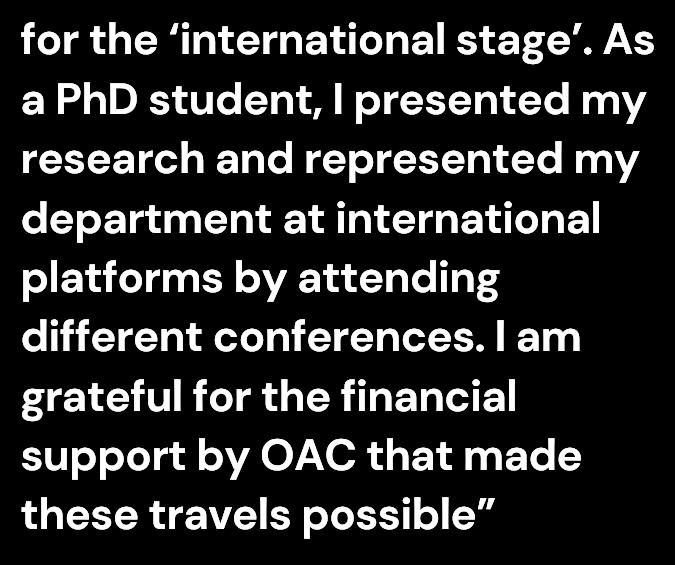

OAC prides itself in attracting and recruiting the best students by acknowledging and rewarding their accomplishments.
As a research-intensive institution, we place great importance on helping students finance their education. We seek to allow students to devote their full energy to the successful completion of their program and strive to ensure that stable funding is available

To support these commitments, OAC’s programs offer a minimum stipend, a significant range of scholarships, bursaries, awards and travel grants, as well as other funding opportunities Some funding is awarded upon admission to a program or is based on recommendations from the admitting program
Thesis-based graduate students receive a funding package made up of a number of components such as some or all of the following: Graduate Stipend, Graduate Teaching Assistantships (GTAs), Graduate Research Assistantships (GRAs), Graduate Service Assistantships (GSAs), plus scholarships/awards (internal or external).
OAC Internal and External Graduate Student Awards
Students must apply directly for internal OAC Awards, and University Awards A comprehensive listing of University of Guelph internal graduate awards is available on the Graduate Award Search page
OAC graduate students are also highly successful in receiving external scholarships Graduate students in OAC are encouraged to review and apply to various external scholarship opportunities
Find out more about applying for Scholarships here
Awards Contact oacaward@uoguelph ca
Arrell Food Institute provides graduate students the opportunity to engage in an experiential learning program that will prepare them to be leaders in the agri-food sector and address key agriculture and food challenges
Several OAC graduate students have been awarded the prestigious Arrell Scholarship at the University of Guelph.
The University of Guelph takes pride in fostering academic excellence through an array of scholarships and awards tailored for our graduate students. These opportunities are designed to recognize outstanding achievements, scholarly potential, and research endeavours.
Programs such as the Ontario Graduate Scholarship (OGS), Tri-Council Awards (NSERC, SSHRC, CIHR), MITACS, and internal awards like the Arrell Food Institute Scholarships and International Doctoral Tuition Scholarship offer substantial financial support, covering tuition fees and providing stipends for living expenses
Find out more about financing your degree here


OAC distributes approximately $5 million in scholarship funding annually. Over half of OAC graduate students hold at least one award thanks to the generous support of our alumni and donors.


OACprioritizesopportunitiesforgraduatestudentdevelopment,wellnessand buildingastrongstudentcommunity.
ThereareamultitudeofopportunitiesforOACgraduatestudentstoengage anddeveloptheirpersonalandprofessionalnetworks,skillsandknowledge, afewexamplesofwhichareoutlinedhere.


Grad Pathways is the University of Guelph’s resource hub specifically designed to support the academic, research, personal, and professional success of our graduate students and post-doctoral fellows
Find out more here
"Being a part of the OAC Graduate Student Council has been one of my most memorable experiences as a graduate student. The council provided me with such amazing opportunities, connections, and skills that I use in my academic and professional career!"
LorraineVandermyden
Current Student MSc (thesis) in Environmental Sciences Advisor: John Lauzon
The 3 Minute Thesis competition assists students with building great communication skills by presenting their research and its wider impact in 3 minutes or less. It challenges students to present complex research in an engaging, accessible and compelling way. OAC graduate students have excelled with several winning not only the University-wide competition but both the provincial and national competitions as well.
As a graduate student, you may broaden your horizons with the opportunity to visit or study at another institution in Canada or abroad. The Ecuador field school (find out more about Field School here) is just one of countless examples of the graduate student travel opportunities
Check out what is happening in our International Development office!
OAC’s graduate student community has strong connections and countless opportunities to build your network through engagement with your graduate student councils. Graduate Student Councils enhance student experience by hosting academic and social events throughout the year and promote an engaging and collaborative environment within departments
Find out more about OAC graduate clubs here




Choosing a university for your post-graduate journey can be challenging.

Within the Ontario Agricultural College at the University of Guelph, we are dedicated to ensuring that your academic journey aligns seamlessly with your passions. Whether your goal is to gain immersive Canadian industry experience, cultivate invaluable skills, or pursue an academic career, our university strives to provide you with the best graduate programs tailored to meet your goals. Application Documents



Now that you have looked at our comprehensive list of programs, here is a list of resources that you can access to start on your Graduate Studies journey with OAC.
Admissions and Application Process
Calculating Your Admission Average
English Language Proficiency
International Applicants
International Credential Guidelines
Funding & Scholarship
Cost of Tuition/Living
Funding Graduate Studies
Graduate Award Search
International and Out of Province Students Living in Canada
New International Students
Graduate Student Housing
Off-Campus Living
Student Experience Resources
Advising and Support
Get Involved On Campus
Graduate Students’ Association
Graduate Skills Development
Student Volunteer Connections
Guelph International
International Student Experience
Guelph International in the Student Experience Office
Immigration and Study Permits
International Student Advising
Welcome to one of Ontario’s most welcoming, sustainable, and diverse cities: Guelph, Ontario. With a population of over 135,000, you’ll get the feeling of a major community and the welcome of a smaller town. The architecture is rich, the downtown core is vibrant, the legacy and cultural diversity is strong, and the community and campus are interconnected. To learn more about Life at Guelph visit graduatestudies.uoguelph
.ca/about/life-guelph
Ridgetown Campus is located in southwestern Ontario (1 hour south-west of London, ON and 1 hour east of Windsor, ON). It is a safe, quiet, and friendly community of 3,500 people where you will get to see the bounty of local agriculture and small-town living.
Life at Guelph
External Volunteering Opportunities
Discover Downtown
Arts and Culture
Parks and Trails
Guelph Tourism
Guelph Museums
Arboretum
Guelph Lake Conservation Area
Art Gallery of Guelph
Farmer’s Market
Guelph Storm OHL Team

Make your journey to and from campus easier with Guelph Transit . The city buses connect you from our campus to anywhere within the City of Guelph Find more information on Guelph Transit.
GO Bus transit connects the University Centre to the Greater Toronto Area and Mississauga, throughout the day during weekdays. gotransit.com
4 distinct seasons
Spring: mid-March to May
10° to 20° C (some rain)
Summer: June to August
20° to 30° C (humid)
Fall: September to November
7° to 20° C (some rain)
Winter: December to mid-March
-15° to 2° C (snow, sunny)
